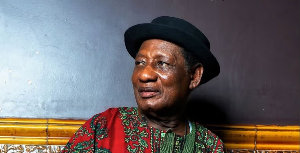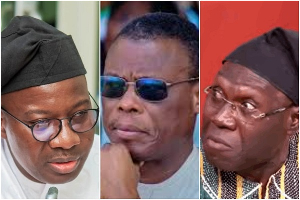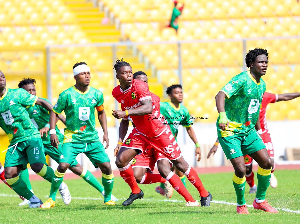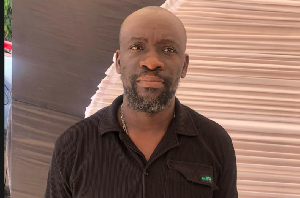By Nana Adjoa Hackman
It is easier to be pessimistic about Ghanaians feeling the prosperous benefits of our new found wealth, oil, than to be optimistic. Anticipatory democracy, in the Ghanaian sense, has seen many Ghanaians redirecting their expectations of a better tomorrow to the Jubilee Fields offshore.
The news today is that the Floating Production & Storage Offshore has been commissioned and on the high seas to Ghana. Production may begin before the end of the year. Though, Parliament is yet to pass any of the new general oil and gas legal and policy framework legislations since the 2007 oil discovery, there are assurances from Government that the Bills are ready for parliamentary consideration.
In spite of all the media attention, there are legitimate concerns about Ghana’s preparedness to ensure that this time we can achieve sustainable development through a rich natural resource; that we can trust those who negotiate on our behalf to do so for us all and generations yet to come.
The evidence for such broad scepticism is in abundance. Ghana’s development of her gold, diamond, manganese, bauxite, cocoa, timber and other natural resources has not resulted in any significant transformation in the economic and social lives of the society.
The legal framework for gold production, for example, has been criticised for being ‘overgenerous to investors.’ Worse still, efforts in the early 1990s to liberalise Ghana’s mining sector to make it more attractive to foreign investors did not adequately take into account the corresponding benefits to the Ghanaian society. There was never a national development policy strategy to integrate mining into the economy, per se. Thus, today the mining sector operates with a virtually enclave corporate mentality and scope, despite some notable reforms.
40 percent of Ghana’s export earnings come from mining. Yet for an economy where more than 80% of activity is estimated to be in the directly non-taxable informal sector, mining contributes to only 14 percent of total tax revenue and 5.5 percent of GDP. Royalties from mining range between 3%-6%. Even where the rules are considered to be self-disadvantageous to Ghana, 15-year stabilisation clauses estop Government from making changes. A case in point was the policy statement from the 2009 budget statement to review mining royalties upwards. Not much has been heard since the budget statement. Revenue agencies have been criticised for their inability to monitor and verify actual production figures declared by the mining firms.
Locals close to mining areas have had to deal first hand with the environmental degradation, pollution of soil, rivers, creeks and other water bodies that have resulted in some farmers and fishermen losing their source of livelihood. Obuasi for instance, with a history of over one hundred years of gold mining has in recent times been described as “a big slum hanging on a thread because it’s underground has been dug up and dynamited”. In Ghana, those perceived by the locals to have benefitted from the export of natural resources are the multinationals and a small group of politicians, top civil servants, chiefs and business elite. In short, mining has not been able to promote sustainable development in Ghana.
The 2006 Ghana Living Standards Survey estimated that 28.5% of Ghanaians were living below the poverty line of US$1.25. This endemic poverty manifested in lack of access to water, electricity, and education and in the crumbling down of existing social and economic infrastructure.
Under the above circumstances, one realises that it would take serious efforts for the story to change in relation to Ghana’s new found oil resource. This is especially so when coupled with the fact that other African countries like Nigeria, Gabon, Angola, Equatorial Guinea, etc, which have been producing oil for many years, have not managed to translate their significant oil revenues into significant development and better the lives of the citizens.
Ghana’s main economic activity is agriculture. The sector employs about 57% of the labour force and contributes between 36 to 40% to the country’s GDP. Blessed with natural resources like gold, timber, industrial diamonds, bauxite, manganese, fish, rubber, hydropower, silver, salt and limestone, Ghana’s per capita output is twice that of the poorer countries in Africa. Despite the above, Ghana’s per capita income is still among the lowest in the world.
Figures released by the Ghana Statistical Service in January 2009 put the country’s GDP growth rate at 7.3%. In order for sustained economic growth in Ghana to occur, private sector participation is crucial. An IMF country report dated July 2009, has however noted that the main stumbling block to private sector development in Ghana is its unreliable power supply.
For obvious reasons the news that oil had been discovered in commercial quantities off Ghana’s western coastline was very welcome by the government and people of Ghana. Apart from oil, the Jubilee field which is currently under development is expected to produce gas from which about 400 megawatts of new power can be generated. This would cater for roughly 30% of Ghana’s annual power consumption. With proven oil reserves estimated at 2 billion barrels, production is expected to begin in the last quarter of this year (2010).
It is expected that oil production would rake in new budgetary resources of up to about 7% of GDP annually (just a little more than mining is doing now) and the government has indicated its intention to devote this new income to embarking on investments to promote growth in order for the country to meet its goal of becoming a middle-income country. The IMF also estimates that Ghana could earn about $1 billion a year from its oil production, commencing from the end of 2010. In order for Ghana to realise its objectives of sustainable growth to benefit both present and future generations, the country would have to take measures to secure efficient revenue generation from the resources, as well as proper management of these funds. These measures include not only setting up the necessary legal, policy and licensing framework for development of the resource in preparation for the start of production, but also implementing to the letter the rules and regulations that we set. This calls for principled leadership of conviction and fiscal discipline.
CHALLENGES TO SUSTAINABLE DEVELOPMENT Some have argued that the concept of Sustainable Development is merely theoretical, lacking any real practical value; a set of good ideas or moral convictions which cannot really be translated into practical use. First of all, for revenues from oil and gas to follow the sustainable development pattern, there must exist such a pattern in Ghana. So, on the generality of national development, how do we ensure that development policies, projects and strategies of Ghana actually reflect Sustainable Development principles?
LEADERSHIP CHALLENGES The greatest challenge to sustainable development in Ghana is commitment of leadership. How to get political leadership that represents the interests of both existing and future generations. Ghana’s mining policy is evidence of the lack of understanding among political leaders and policy makers of the interdependency among social, economic and environmental systems.
The design and implementation of Ghana’s oil and gas policy must be of a strategy comprising the whole mix of Sustainable Development Initiatives, namely – economic, regulatory, expenditure and institutional initiatives. It is not that politicians may not be conscious of the need to spend our oil revenues productively but the pressures and exigencies of the four-year electoral cycle may be the biggest challenge to spending our oil money responsibly.
OIL AND SUSTAINABLE DEVELOPMENT
Rents received from the extraction of the exhaustible resource like oil must be invested into building reproducible capital at a level that balances out the rate of depletion of the natural resource and also guarantees that the nation’s consumption level remains constant and does not decline The famous Brundtland Report of 1987, titled “Our Common Future” defined sustainable development as ‘development that meets the needs of the present without compromising the ability of future generations to meet their own needs.’
The BP oil rig spillage in America is but a timely reminder to Ghanaians of certain unpleasant side effects that the exploitation of petroleum, even when it is offshore, has on the environment.
Apart from economic and environmental challenges, the development of oil and gas resources in Ghana will be accompanied by certain social problems. Thankfully, the offshore location of Ghana’s oil calls for no direct resettlement of people, yet rents for property in Takoradi and surrounding areas have skyrocketed in the last couple of years, a predictable development that is good for landowners and bad for ordinary working tenants.
Again, a real social concern here is the potential for loss of traditional livelihood to local inhabitants of the oil and gas bearing region. Even at this development stage, prior to the commencement of actual production of petroleum in Ghana, local fishermen fishing in the waters off the cape three points region have already began to feel the ugly effects of this. The critical issue for sustainable development is how oil can be produced in a manner that does not disrupt the ability of local fishermen, etc to earn their livelihood.
Inequalities in income and wealth distribution are also another face of the issue. Where oil and gas is produced, inadequate national policies to streamline income and wealth distribution could result in huge disparities between the incomes of persons working in the petroleum industry and those employed in other industries. The disparities in wealth distribution would also exist between the oil and gas bearing region and other regions of the country that are not that well endowed. Such inequalities have for a long time been and continue to be problematic in Botswana for instance, despite the country’s successful management of her diamond resources. Would the policies being fashioned out by Government anticipate and deal with such a possibility?
The authorities in the Western Region, especially the twin city of Sekondi-Takoradi should also brace themselves for unusual migration movements westward. We are going to have mass migration of citizens from poorer regions of the country to the petroleum bearing Western Region, thus, making it more difficult for those regions to catch up developmentally. What is being done to anticipate and deal with this real prospect?
The eventual effect of this is the movement of labour from other sectors to the petroleum sector thus killing off those other sectors like agriculture, manufacturing and the service sectors.
Again, there are issues of marginalisation of unskilled workers. Since the petroleum industry is highly skilled in nature, it makes little room for the employment of unskilled local citizens especially at the very inception of the industry in the particular country. Usually at such times, there is huge reliance on skilled expatriate staff. Ghana is at this very point. Attaining sustainable development through the development of the oil and gas resource would involve ensuring training of local staff in order that they are put in a position to benefit from the industry. The usefulness of any local content policy is dependant on systematic efforts to build local capacity for the opportunities available.
The human rights angle of sustainable development emphasises a people-centred approach to development. It presents a wider view of development that creates more room for choice by women, men and children of both present and future generations, “while protecting the natural systems on which all life depends”. However, a serious challenge that Ghana is all so familiar with in our quest for increased foreign investment is how to ensure a co-existence between the increased corporate activity, and a respect for the human rights of the local citizenry.
Our history glitters with many instances where foreign investment in the natural resource sector has not resulted in the social and economic development of the local community, Akwatia, Obuase and Prestea easily come to mind. In many of such cases also, the initial planning, development and negotiation of new projects did not consider the interests and human dignity of the people whose lives would be most closely affected.
If Ghana is to attain sustainable development through the development of her oil resources and the management of revenue arising thereto, then there should be serious commitments to eradicating poverty and providing equal opportunities through good governance for all citizens to realise and enhance their inalienable human rights, to be specific, their economic, social, cultural and political rights.
Significantly over the last 20 years, Ghana has been able to secure massive investments in her gold mining industry. The irony of the situation is that this has not translated into any significant government revenue. Rather there has been conflict between mining companies and local communities, eviction of locals from their lands and worsening environmental damage. In spite of recent actions towards voluntary corporate social responsibility (mining firms claim to have spent $12m in 2008), gold has failed woefully to deliver sustainable development to Ghanaians. If Ghana is to do better in the development of her oil resources and avoid the famous resource curse, then her policies for licensing, taxation, revenue management and expenditure should be fashioned along the lines of sustainable development. This calls for prescriptive measures to ensure that lasting economic growth can be achieved out of Ghana’s finite natural resources. To secure our own survival and that of future generations of Ghanaians, it is imperative that we focus on ensuring that all present and future development efforts are structured towards attaining sustainability. So far, the jury is still out on this important matter of the prospect of Ghana’s oil and gas industry for sustainable development.
The author, a corporate lawyer, has an LLM with specialisation in Petroleum Law and Policy from the Centre for Energy, Petroleum and Mineral Law and Policy, University of Dundee, Scotland. email: darlingrid@yahoo.com
Figure 1: Map of southern Ghana showing offshore oil fields
Opinions of Thursday, 13 May 2010
Columnist: Hackman, Nana Adjoa
Can Oil Succeed Where Gold Failed Ghanaians?
Entertainment













